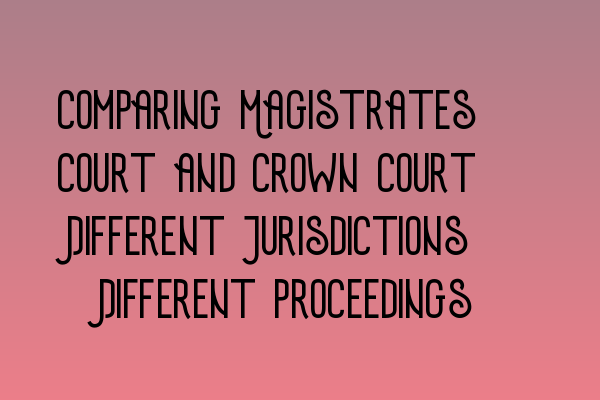Comparing Magistrates’ Court and Crown Court: Different Jurisdictions, Different Proceedings
When it comes to criminal trials in the UK, two main courts preside over the proceedings: the Magistrates’ Court and the Crown Court. Understanding the differences between these two jurisdictions is crucial for anyone involved in criminal law. Whether you are a solicitor, barrister, or aspiring law student preparing for the SQE exams, gaining knowledge of the distinct features of each court is essential.
The Magistrates’ Court
The Magistrates’ Court is the first port of call for the majority of criminal cases. Also known as the summary court, it handles less serious offenses, such as minor assaults, thefts, and traffic violations. The court consists of lay magistrates, who are volunteers from the local community, and a district judge.
Proceedings in the Magistrates’ Court are relatively informal compared to the Crown Court. The hearings typically involve shorter, less complex cases that can be resolved swiftly. The magistrate or district judge decides on guilt or innocence and determines the appropriate sentence if a conviction is achieved.
It’s worth noting that some cases may start in the Magistrates’ Court and later be sent to the Crown Court if they are deemed too serious for summary trial, such as cases involving serious violence or major fraud.
The Crown Court
The Crown Court, on the other hand, deals with more serious criminal offenses, often referred to as “indictable offenses.” These include offenses such as murder, rape, robbery, and complex fraud. The court is presided over by a judge, and cases are heard before a jury (usually 12 members).
There are several key differences between the Magistrates’ Court and the Crown Court. Firstly, the Crown Court has greater sentencing powers, being able to impose longer prison sentences compared to the Magistrates’ Court. Additionally, trials in the Crown Court tend to be lengthier and more complex, often involving expert witnesses and detailed legal arguments.
Unlike the Magistrates’ Court, which operates on an “either way” basis (i.e., the defendant can choose to have the case either heard in the Magistrates’ Court or the Crown Court), certain offenses can only be heard in the Crown Court. These are known as “indictable only” offenses.
Choosing the Right Court
As a solicitor or barrister, it is essential to understand which court is the most appropriate for your client’s case. Factors to consider include the seriousness of the offense, the potential sentence, and the complexity of the legal issues involved. Making an informed decision on the court jurisdiction can significantly impact the outcome of the trial.
For aspiring law students preparing for the SQE exams, knowledge of the differences between the Magistrates’ Court and the Crown Court is vital. These topics are often covered in the Criminal Law and Practice module of the SQE exams.
For further practice materials and exam preparation courses, check out the following related articles:
